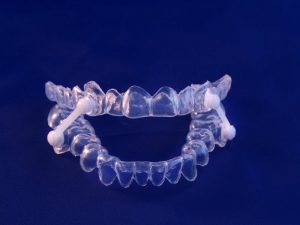 You’re facing a dilemma – you have missing teeth and sleep apnea, two serious issues that can’t be ignored. The former leaves your jawbone without the support it needs to continue to produce new bone cells while the inability to sleep properly can lead to serious health problems like heart disease and high blood pressure. One of the common ways to address missing teeth is to have dentures placed, but will they work with an oral sleep appliance in State College? As you read on, your dentist answers this question and provides other helpful information.
You’re facing a dilemma – you have missing teeth and sleep apnea, two serious issues that can’t be ignored. The former leaves your jawbone without the support it needs to continue to produce new bone cells while the inability to sleep properly can lead to serious health problems like heart disease and high blood pressure. One of the common ways to address missing teeth is to have dentures placed, but will they work with an oral sleep appliance in State College? As you read on, your dentist answers this question and provides other helpful information.
Sleep Apnea Explained
Let’s start by getting an understanding of what sleep apnea is. It’s the temporary interruption of your breathing while sleeping that causes you to awaken several times throughout the night. This leaves your body deprived of the rest it needs to recover from the previous day.
The cause of the problem is a collapse of the muscles in the throat that makes it hard for oxygen to pass through. Thus, your brain sends distress signals throughout the night that cause you to wake-up so you can breathe.
The Treatment for Sleep Apnea
Here are the two main options for treating sleep apnea:
- CPAP Machine – This is a machine that forces air into the throat while you sleep using a mask that connects to the base unit via a tube.
- Oral Appliance – An alternative to the CPAP machine is an oral appliance that easily fits into your mouth and changes the alignment of your jaw so that your throat stays open while you sleep.
Many patients prefer the latter option because it is quiet and more comfortable, but the question still remains – can an oral appliance be worn along with dentures?
The Problem with Dentures
One of the issues that denture wearers face is that an oral sleep appliance needs the presence of teeth to be properly secured, but traditional prosthetics need to be removed at night for cleaning and to let the gums rest. Then, because dentures only fit on top of the gums, they still wouldn’t provide the security needed to hold an oral appliance in place.
Dental Implants – The Answer to the Problem
To replace your missing teeth and receive the sleep apnea therapy in State College you need, the answer is to have dental implants placed. The process involves your dentist surgically inserting titanium posts that affix to your underlying bone structure, providing the support you’ve been missing. A set of implant-retained dentures can then be added.
One of the differences between the latter and traditional prosthetics is the level of security and stability provided. Because the implant-retained denture attaches at the root level, an oral appliance can be successfully placed, and two big problems can be taken care of.
To learn more about how your dentist can help you overcome the challenges of having both sleep apnea and missing teeth, reach out today to schedule a consultation. Soon, you’ll be getting the rest you need and smiling with confidence!
About the Author
A graduate of the University of Pittsburgh, Dr. Donald Marks specializes in treating sleep apnea and replacing missing teeth. He has received advanced training from such prestigious organizations as the Institute of Advanced Dental Studies (in Periodontal Prosthesis) and the American Academy of Dental Sleep Medicine, which he uses to help patients sleep better and regain the function of their teeth at State College Dental Sleep Medicine. Dr. Marks can be reached for more information through his website.
